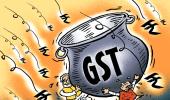Assembly elections coming up in November and December could offer a window of opportunity to the government to make GST attractive through rate cuts.
Illustration: Uttam Ghosh/Rediff.com

Goods and Services Tax, which turned one on July 1, is likely to usher in significant reforms by 2019, experts and consultants believe.
The changes could be in terms of tax rates, expansion of ambit, system of advance rulings, clarity on cess and procedural issues.
But, some tweaking is possible much sooner. For instance, minor rate cuts in the range of 1-2 percentage points may be announced to incentivise digitalisation, anti-profiteering authority is likely to start imposing fine on companies and the refunds process is expected to be more streamlined.
Some of the major changes, including single return filing system, would follow beta testing of new software for return simplification towards the year-end.
Assembly elections coming up in November and December could offer a window of opportunity to the government to make GST attractive through rate cuts, an analyst said.
After previous rate cuts on over 200 items in November 2017, just ahead of Gujarat assembly elections, almost 50 items are left in the 28 per cent tax category.
There’s a huge demand to prune this category and eventually remove the slab altogether, besides converging 12 and 18 per cent rates.
In fact, outgoing chief economic advisor Arvind Subramanian also batted for removal of 28 per cent tax rate.
The GST fitment committee is already looking at reducing the peak rate on paints, varnish, cement, marbles, tiles and digital cameras.
Former CBIC chairperson Vanaja Sarna, who retired a couple of days ago, sounds a word of caution.
"Before touching rates further, we need to reach a comfort zone, as far as revenue is concerned."
Although the Centre and states have got Rs 1 trillion in April, it was an aberration since arrears of the previous months were paid.
As such, the revenue came down to Rs 940 billion in May. The target is to collect almost Rs 1 trillion a month on an average in 2018-19.
"We have promised a very ambitious growth rate of 14 per cent to the states. We have to keep up that promise.
"The Centre should also get 14 per cent, after giving compensation to the states. That is our main concern as of now.
"After that, a lot of other reforms can be done," says finance secretary Hasmukh Adhia.
The industry wants things to ease in GST. For example, Sandeep Aggarwal, CEO, Droom, an online marketplace for buying and selling new and used automobiles, says, “We hope the government will revisit the high GST rates affecting some businesses.”
The sale of new and old cars on online marketplace draws 28 per cent GST.
Also, S P Singh, convenor of All India Tyre Dealers' Federation, wonders ‘’if GST could be cut on cement and paint, why can't it be done on tyres of commercial vehicles."
Despite much hype, GST is still levied on only 60 per cent of the country's economic activities. Petroleum, real estate, potable alcohol and electricity are out of its domain.
In the case of petroleum, five products -- crude, diesel, petrol, natural gas and aviation turbine fuel -- do not attract GST.
While the government has stated that petrol and diesel would be part of the GST, it seems like a long way off.
Real estate has been another tricky area and there were talks of including it in the GST, but there’s been no headway.
While work contracts of under-construction houses are under GST, others are out of it, including the stamp duty and land.
This is resulting in lopsided taxation.
Says Niranjan Hiranandani, president, National Real Estate Development Council, "the GST applicable on ready possession, occupation certificate received homes is zero, while on an under construction home, it is levied at 12 per cent."
Moreover, bringing electricity and alcohol under GST has not even been discussed.
Among other issues, while the GST system has a mechanism for the Authority for Advance Ruling, its orders have fuelled resentment.
"The applicants were reaching out to the AARs for certainty, but due to the divergent views, only confusion has been added for the applicants," says Abhishek Rastogi, partner at Khaitan & Co.
It therefore becomes imperative that a central authority is formed so that there is consistency to some extent, Rastogi says.
The GST Council is also grappling with the issue of imposing a sugar cess at the rate of Rs 3 per kg to address the plight of farmers.
There is no consensus whether such a cess can be imposed in the GST system.
Hence, a committee under the Assam finance minister Himanta Biswa Sarma is looking into the matter.
While any such cess may help cane farmers, experts point out that this would distort the GST structure.
"The downside of opposing a cess on sugar is that it would entail bringing in a new law and increase issues relating to compliances and input tax credit," Abhishek Jain, partner at EY India, says.












 © 2025
© 2025